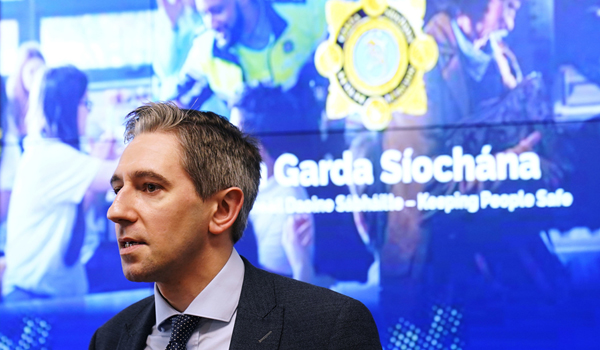Bolstering Garda numbers post-Covid has taken time, says Simon Harris
Bolstering Garda numbers following pandemic disruption to recruitment has taken time, the justice minister has said.
Simon Harris said forced closures of Templemore Garda training college during the Covid emergency resulted in around 1,000 fewer recruits joining up.
He insisted efforts to replenish the ranks were now making progress, with more resources being made available to the Garda commissioner.
Mr Harris was commenting as he and Garda Commissioner Drew Harris attended the official opening of a new 999 Garda call handling facility at the National Train Control Centre (NTCC) at Heuston Station in Dublin.
At the event, the minister was asked by reporters about calls for the Garda to establish a dedicated public transport unit. He said he was less fixated on what Garda units were called than what they did.
“I know as a public representative, I know as minister for justice that often people flag that feeling of not being safe on public transport,” he said.
“Therefore, I do want to see as Garda numbers grow, the ability for the commissioner to increase the visibility of gardai in and around public transport hubs.
“I think today is a step in the right direction. So, I don’t fixate on whether these are called transport police or anything else. We have a police force, it’s called An Garda Síochána, and they do a really good job. I want to grow the number of people working in An Garda Síochána so that the Garda commissioner has an ability to employ more people right across our country and particularly in relation to public transportation.”
He added: “I know people may not like people harping back to Covid, but it is a statement of fact that we saw the Garda College in Templemore closed at least twice during the Covid pandemic.
“We probably, as a result, saw at least a fewer thousand sworn members of An Garda Siochana as a result of that closure of the college.
“It takes time to then ramp back up what is a pretty major machine around Garda recruitments because it involves vetting, it involves medicals, it involves fitness tests and of course it involves the completion of the training itself.
“I’m very confident that that’s now beginning to work, that we now have the funding in place to recruit 1,000 additional gardai this year and, more importantly, that we’re now back seeing regular intakes into the Garda College.
“So, you’re seeing a new class start in the Garda College now every 10 to 11 weeks and I believe you will, as a result of that, the trend will be upwards in terms of classes growing and in terms of Garda numbers growing.”
The Garda’s Dublin Metropolitan Regional Control Room has been relocated to the National Train Control Centre at Heuston station.
The Dublin centre is the busiest of the four 24/7 999 call facilities the Garda operates in Ireland. It is staffed by 100 gardai and Garda staff and receives between 800 to 1,000 calls a day.
It is envisaged that the Garda will co-occupy the centre with Irish Rail, Dublin Fire Brigade, the National Ambulance Service and Dublin City Council, with the aim of increasing collaboration between key state agencies.
At the official opening, commissioner Harris paid tribute to those Garda staff who handle 999 calls.
“They are very dedicated to their work,” he said.
“They are people on the front line. They take on what at times can be the most challenging and time-sensitive calls that one can imagine, very often they’re dealing with exceptionally difficult and traumatic situations.
“But our team here play an absolutely invaluable role being on the end of the phone dealing professionally with individuals in their greatest need.”


